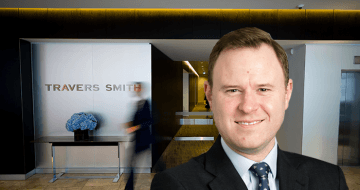Travers Smith’s Sivanti Devakumar shares her career story and how high-quality work combined with the firm’s collaborative culture and supportive training environment is what made her join and stay

“The partners aren’t just knowledgeable, market-leading tax practitioners. They genuinely love what they do and they see it as both their responsibility and good business sense to help you love what you do and realise your potential to the fullest”, says Siv Devakumar, senior associate in Travers Smith‘s tax team, while explaining what motivated her to make the move to Travers Smith.”
For those that are fans of high-energy law school class discussions, Travers Smith’s tax team will not disappoint. “Sitting down with a partner to discuss negotiation strategy on an acquisition or how to restructure a distressed group’s debt is a bit like a university tutorial or seminar — they know how to push you out of your comfort zone but even when I’ve got it completely wrong I come away with the buzz of learning something new,” says Devakumar. “In my experience, varied, highly stimulating work is most enjoyable when it comes with ongoing training, support and role-modelling from senior lawyers and, most of all, encouragement to be yourself and not just fit into some sort of firm mould.”
Indeed, this especially collaborative culture and “warm and supportive” training environment was one of the main reasons Devakumar decided to join Travers Smith from a magic circle firm in 2018. Devakumar describes how their unique four-person rooms are a microcosm of that culture and environment: “At three years’ qualified, our room structure gave me an unprecedented level of access to how a partner thinks through a technical issue, nurtures client relationships or handles awkward conversations. It really helped me develop my technical knowledge and also my own commercial judgement and style of client relationship building in a very organic way. Having a senior lawyer keep a close eye on my workload and general well-being has also made a real difference to my mental health at times.”
This “training by osmosis” is accompanied by weekly department training sessions on technical or new areas of law. She details:
“The training at Travers Smith is heavily partner and associate-led, as opposed to being solely provided by knowledge support teams. This means you really get to understand how lawyers in the field are actually applying the law. You’re then armed to argue a point in a live negotiation yourself rather than just listening in while the partner does it.”
Amongst the key concerns in the industry at the moment are helping clients to judge how to take an approach to tax which is not only legally robust but also consistent with their ethical values and standards of governance, given the increasing focus in the last few years by the public and the media on the tax affairs of businesses and individuals. “We expect tax to form a key part of our clients’ focus on ESG [environmental, social and governance] in the coming years and many are already thinking about what being a ‘good taxpayer’ means in that context,” Devakumar remarks. “We find that we can play a valuable role through our understanding of market trends and likely policy changes in helping clients to assess this.”
In her experience, Travers Smith strikes the right balance between allowing juniors to take on more challenging work such as free drafting bespoke indemnities for a Sale and Purchase Agreement, whilst simultaneously ensuring they feel well-supported and confident. “You work very closely with the partners so you can have a go at everything as whatever help you need is right there on standby. There’s no panicking that you’re too far out of your depth but nor are you held up by unnecessary formalistic obstacles,” says Devakumar. Seniors are similarly encouraged to pass on their knowledge to the junior members of the team, including trainees and paralegals. “It’s a win/win for everyone really as it means juniors get to do more interesting and valuable work and the more senior associates have more time to do new and more difficult things.” This open and collaborative feature of the training at Travers Smith translates into a smooth transition to tackling more complex work.
Devakumar also stresses the importance of developing good communication skills and an aptitude for building strong relationships with clients. It is for this reason she says that the job lends itself well to “people people” who can engage clients and enjoy “learning what’s important to them and how to tailor our legal advice to their needs”.
Travers Smith supports its lawyers in this aspect by inviting them to client meetings from the very beginning of their careers. “The firm trains you to win work by getting you involved in preparing pitches and fee quotes, but also by allowing you to interact directly with clients,” explains Devakumar. And all this is supplemented by soft skills sessions and ad-hoc training opportunities.
As well as business development, Devakumar also lauds the firm for its flexibility in supporting its lawyers in their personal lives. Having recently returned from maternity leave, she describes how the firm encouraged her to focus on her family’s needs and had the flexibility to allow her to work four days a week. “They [Travers Smith] try very hard to care for you which is so important for a career in law. They appreciate that for such a long-term career to be sustainable, you often have to work at different paces at different points.”
Returning to tax, Devakumar is quick to dispel the widely-held notion that maths skills are essential to being a successful tax lawyer, candidly confessing, “I’m not great at maths!”. Instead, she underlines that a good dose of “common sense and commercial awareness” are key ingredients for tax lawyers. “The tax code is mostly based on a set of core principles that should be logical”, she explains, which might make it “more reminiscent of constitutional law” than anything else. She goes on: “everything I do has a commercial context — it is certainly not just sitting in an ivory tower pointing out tax problems! We work with the client and the rest of the cross-departmental Travers Smith team to come up with business savvy solutions that work for the deal overall”.
Being a team player is important in technical departments too: “as a transactional tax lawyer, I love the adrenaline from working on transactions but I can also find myself doing very difficult and/or frustrating things at antisocial hours. I’m never alone though and having a good sense of humour and perspective can go a very long way — be that sharing some gallows humour with colleagues over Teams chat on a late night, or taking a minute on a client or negotiation call to exchange pleasantries and dispel some tension before you get into the nitty gritty.”
So, what are Devakumar’s top tips for wannabe lawyers considering applying to Travers Smith? “Do your homework and get to know us. There’s a wealth of information on our grad rec website and in the legal press. Personally I think there’s no replacement for speaking to people at the firms you’re interested in”, she explains, emphasising the importance of taking advantage of in-person or virtual firm events or those held by university law societies and graduate recruitment specialists. “Use these opportunities to find out what their typical day is like, the good and bad things about their jobs and so on — ultimately ask yourself whether you’d enjoy spending time with these people, doing what they do.”
Regarding the Travers Smith application, Devakumar says:
“Don’t be generic. The best way to stand out is just to be yourself. We want to know why you want to come to Travers Smith, but also how your individual experiences have shaped you and what you bring to the table outside of your academic achievements. The cover letter and CV-style form is your opportunity to show that, but just be prepared to answer questions on anything you’ve written in your interview.”
Sivanti Devakumar will be speaking at ‘Careers in law: reflections from Travers Smith’, a virtual student event taking place on Tuesday 11 January. You can apply to attend the event, which is free, now.
About Legal Cheek Careers posts.


